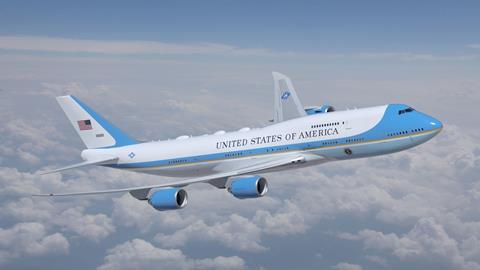The issue-plagued Boeing VC-25B programme to deliver two new presidential jets to the US Air Force (USAF) is absorbing fresh production delays that will push the type’s first flight into 2026.
The VC-25Bs are meant to replace the USAF’s two 747-200-based VC-25As now serving as Air Force One. Both those jets entered service in 1991.
Boeing in 2018 won a $3.9 billion contract with the USAF to deliver two VC-25Bs, which are heavily modified versions of 747-8 passenger jets. At the time, the new presidential aircraft were expected to enter service in December 2024.
That target subsequently slipped two years to 2026 after the programme was impacted by supply and labour disruptions from the Covid-19 pandemic, alongside engineering challenges.
The programme timeline is changing again, and not in Boeing’s favour. The USAF now says first flight of the VC-25B will not occur until March 2026 – a 16 month revision. The news was reported by Breaking Defense on 14 June.
Air force officials say Boeing is still developing a revised programme schedule and those dates could be adjusted further.

Repeated delays and cost overruns on the programme have racked up massive financial penalties for Boeing. For example, the VC-25B accounted for $428 million of negative cash flow in a single quarter of 2023.
The airframer submitted an aggressive bid for the Air Force One replacement contract, but did so under a fixed-price agreement. Such deals lock suppliers into terms, precluding them from passing higher costs – which spiked during the pandemic – to the military.
“In a fixed-price environment, any hurdles can produce insurmountable costs,” Boeing chief executive Dave Calhoun noted in 2023.
Boeing in recent years signed other fixed-price deals, including for development of the T-7A jet training. Such agreements have cost the company billions of dollars.
Boeing’s executive team has since promised to abandon the fixed-price approach, even going so far as walking away from a $13 billion opportunity to develop the Pentagon’s new fleet of nuclear command and control jets.
While Boeing expects better financial performance from the high-volume, single-engined T-7A fighter programme, Calhoun essentially wrote off the VC-25B as far back as October of 2022.
“We’re trying to assess these programmes with real clarity and realism, with respect to what we’re experiencing now,” said Calhoun at the time. “[We are] not projecting a significant improvement in the future.”
The low-volume nature of the VC-25B programme, combined with the complexity of assembling a transport and mobile command centre for the US president, make it unlikely the pre-pandemic VC-25B contract can become profitable for Boeing, Calhoun said.































